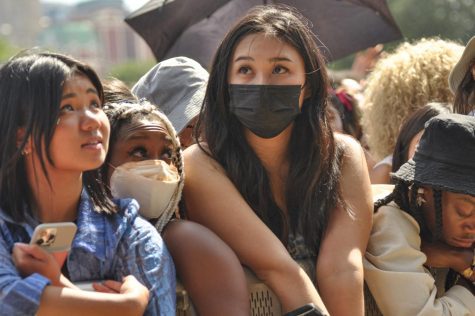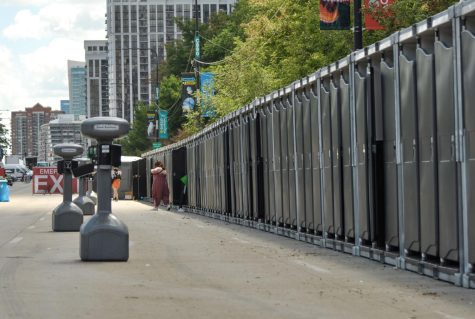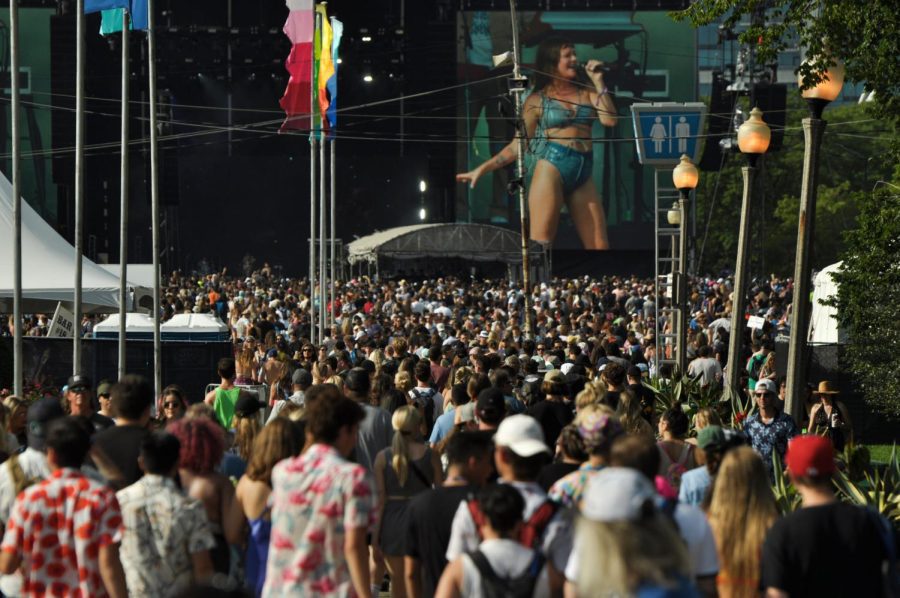Festivalgoers worry about potential super-spread after Lollapalooza’s lack of COVID-19 safety protocols
Lollapalooza attendees walk to and away from the Bud Light Seltzer stage at the first day of Lollapalooza on Thursday. Many festivalgoers are concerned about the lack of COVID-19 safety protocols.
Aug 2, 2022
It’s been more than two years since COVID-19 hit, canceling countless music festivals in the country, including Coachella, Bonnaroo Music and Arts Festival and Chicago’s own Lollapalooza.
Held in Grant Park, Lollapalooza hosts an estimated 400,000 each July, and this year, it had the green light from the city to sell enough tickets to reach this full capacity number.
But despite Chicago’s status as a high-risk city for COVID-19 transmission, everything seemed back to normal at Lollapalooza 2022, with a majority of festivalgoers, staff and artists choosing to go maskless.
For some attendees, the festival’s lack of COVID-19 safety protocols, such as the requirement to provide a negative COVID-19 test or vaccine card, was problematic.

Saturday was Momi Sica’s first time attending Lollapalooza. The Minnesota native said the festival’s lack of COVID-19 safety protocols — such as mask wearing and showing proof of vaccination — felt unsafe, especially because of the large number of people in attendance.
Get The Daily Illini in your inbox!
“I think Lollapalooza could have done better, but I feel like they kind of just brushed COVID-19 off,” she said.
Although Sica is fully vaccinated against the virus, she acknowledged the risk she took in going to Lollapalooza, adding that the festival organizers could have done more for festivalgoers.
“I feel like they could limit their tickets,” she said. “It looks like they didn’t sell out of tickets until like yesterday (Friday) or last night, and I feel like they’re letting so much people in, like, they could probably like lower the amount of tickets.”
Canadians Julia Bifolchi and Galaxy Thai are also fully vaccinated for COVID-19. Last week was the duo’s first time attending Lollapalooza, and they shared similar concerns about the lack of COVID-19 protocols.
Bifolchi said the festival should have either required patrons to wear masks or provide proof of their COVID-19 vaccination. But with the large number of attendees who didn’t wear masks, she acknowledged that it was difficult to abide by her sentiment while attending the festival.
“It’s kind of hard not to just go, ‘Well, if everybody’s not going to care, then honestly what’s the point?’” she said.
From Thai’s perspective, wearing face masks in Chicago’s hot summer temperatures could also be dangerous for festivalgoers, especially after she witnessed someone have a heat stroke earlier that day.
Thai said Lollapalooza needs to set better protocols to contain a potential spike in COVID-19 cases in the city.
“I don’t think masks and the heat are good things,” Thai said. “Like, I’d rather everybody have vaccine proof to come inside and have them uploaded somewhere, like not just a paper copy that can be edited in Photoshop, but like an actual barcode or something.”
But after more than two years of living through an ongoing pandemic, the duo said enough is enough.
“I think we’re all just tired,” Thai said. “As bad as it sounds, if I get COVID, I’ve gotten COVID, like, weve been stuck for years.”
Thai, a flight attendant, said there’s only so much she can do to protect herself, including washing her hands, not touching her face and being vaccinated.
“I can’t control what other people do, obviously,” she said. “So if I get it, I get it, and then I’ll try my best to keep it to myself and not give it to other people. But like at this point, what are we going to continue doing? Just stay at home all the time and get even more depressed?”
Bifolchi said she already contracted COVID-19 from a family member, so catching COVID-19 at Lollapalooza is no different from what she’s already experienced.
“Whether I come to an event like this or whether I go to work and I bring it back home, it’s hard because we can’t control what other people do, so we can only do so much to protect ourselves,” Bifolchi said.
However, they agreed that Lollapalooza can do better in providing a safer environment for festivalgoers, such as by providing actual handwashing areas near the bathrooms instead of hand sanitizer stations.

“It’s been the most disappointing thing,” Thai said. “We’ve refused to use the bathroom here just because I don’t want to use the bathroom and only have sanitizer, like, I want to be able to wash my hands.”
Bifolchi and Thai weren’t the only ones who noticed Lollapalooza’s lack of sanitary areas.
This year was James Williams’ second time attending the festival. The Chicago native said he wishes the festival organizers had put more COVID-19 protocols in place to prevent a superspreader event in his city.
“They could obviously do a lot more in (providing) actual hand washing stations, more that are not around the bathrooms, you know, just around,” he said. “There’s definitely a lot they could do, but they won’t.”
However, because Williams is fully vaccinated and lives alone, he said the lack of restrictions isn’t a big enough reason for him not to attend.
“The odds of me spreading it (COVID-19) to somebody in my house are obviously zero,” he said. “But obviously, I wish we had vaccine mandates and all that, but it’s not a thing.”
Chicagoans Carmen and Angelina R. also noticed the lack of hand-washing stations at the festival. The duo — who wished to keep their last names partially anonymous — added that they worry about the potential fallout in Chicago schools after the end-of-the-summer festival.
“There are so many people (at the festival) from Chicago, and school’s starting soon for a lot of kids,” Angelina said. “It’s definitely a little worrying going back to school and having all these people that have been to Lollapalooza, and possibly catching something.”
Angelina added how the festival should’ve maintained its requirement for patrons to show proof of a COVID-19 vaccination. Carmen agreed, saying the absence of COVID-19 precautions at the festival is doing more harm than good.
“The lack of just talking about what’s going on and people ignoring the research and not keeping up to date with things is definitely causing this idea of post-COVID, which is not here yet,” Carmen said.
Because the duo is fully vaccinated, they said they didn’t feel unsafe attending Lollapalooza, but they’ve been more aware of their surroundings. Carmen said there’s an etiquette that non-Chicagoans should follow when they come to the festival.
“People who come unvaccinated and then don’t take those (COVID-19) precautions, it’s like, this isn’t your home,” she said. “Be respectful coming into someone’s home. You take your shoes off, wash your hands, say ‘please’ and ‘thank you,’ It’s just basic manners.”






